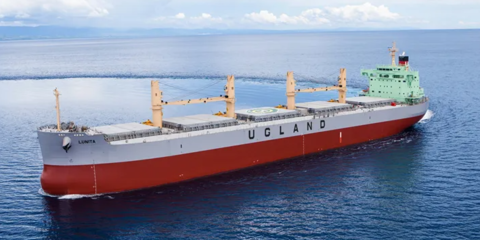The UK is considering expanding its plan to bring maritime into its Emissions Trading Scheme by moving beyond domestic shipping.
Officials are running a consultation on requiring shipping companies to buy carbon credits covering voyages to and from regional neighbours, including countries in the European Union, whose Emissions Trading System (ETS) entered into force in January this year.
For more than two years, London has been planning to integrate shipping into the UK scheme, starting in 2026, but initial plans called for it to cover domestic shipping only.
Officials are seeking comment on broadening the scope to include voyages between the UK and the European Economic Area — made up of the EU plus Iceland, Liechtenstein and Norway.
That is still not as broad as Brussels’ emissions trading rules, which cover 50% of voyages from the EU to countries outside the bloc, but more than 40% of the UK’s foreign trade is with EU countries.
For Jon Hood, the UK sustainable shipping manager at advocacy group Transportation & Environment, the latest consultation is a positive step — especially when compared with where the country is today.
“Thanks to years of government inaction, the UK maritime sector produces around 20% of the UK’s transport greenhouse gas emissions,” he said, noting that Parliament’s Climate Change Committee said the country has “no credible policies” to reduce maritime emissions in line with its net zero goals.
“So, the UK is in serious trouble here.”
Hood said — “cautiously” — that he thinks the latest proposal is a step in the right direction.
‘Not a policy document’
“What has been published is not a policy document. It’s a consultation, and it contains a series of proposals which, if implemented, will eventually put a modest price on some UK shipping greenhouse gas emissions. But it’s a big if,” he told TradeWinds’ Green Seas podcast.
“Secondly, the UK needs a framework of credible policies to support its maritime sector to decarbonise, and emissions pricing is an important element of that, and revenues can, of course, be used to drive further decarbonisation, but it’s just an element.”

He also noted that only some of UK maritime emissions, which he estimates at £585m ($745m) in potential annual revenue, would be priced under the proposals in the consultation.
When the results of the first consultation to bring domestic shipping into its emissions trading rules were announced in 2023, the UK Chamber of Shipping described that as a significant step.
But it called for funds collected by the scheme to be invested back into decarbonising the British maritime sector.
At that time, the government indicated that it could look to extend the scope of the regulation.
But now that shipping has experienced the EU emissions trading rules, the chamber wants officials in London to learn from the lessons of implementing that regulation.
“It is crucial to highlight that the extension of the EU ETS to the shipping industry has not been without significant challenges, some of which remain outstanding,” the chamber said in a document published last month.
It said the UK needs a robust digital monitoring, verification and reporting system.
Avoiding double payment
It also said the scheme needs to avoid double payment, and the British proposal attempts to achieve this by requiring shipping companies to buy carbon credits for 50% of EU voyages — with Brussels’ rules covering the other half.
But the chamber also wants to ensure that there is no double payment on emissions covered by a future global system under consideration by the International Maritime Organization.
And it called for London’s scheme to follow the EU measure’s definition of the company responsible for turning in carbon credits.

Among other requests, it suggested a phased implementation of the British emissions trading rules.
Although Hood is positive on the proposal, it leaves much to be done if it is to bring UK’s shipping emissions in line with the Paris Agreement’s climate goals.
He said Transportation & Environment’s modelling shows that the UK would have to cut maritime emissions by one-third in 2030 to reach net zero, and they would have to “all but vanish” by 2040.
“The UK needs to publish a clean maritime plan that properly supports the whole sector’s transition away from fossil fuels and towards zero-emission alternatives,” he added.
“Elements of that plan should include capping emissions, mandating the use of renewable hydrogen-based fuels, electrical propulsion and shore power, but it also needs to include strong pricing.
“And critically, this has to apply to all UK emissions, domestic and international.”
Hood said the good thing is that the latest consultation shows officials are willing to include international emissions in the UK’s regulatory framework.(Copyright)




